When in your life you watch a show can matter just as much as the show itself. Perhaps you first found Tokyo Godfathers and its story of found family right after your parents divorce. Or Tatami Galaxy while in your freshman year of University. It could even be as simple as Fullmetal Alchemist: Brotherhood being your first anime ever. The show might be good, fantastic even, but the when is what made it timeless for you. How do I know this? Because that’s exactly how I felt as I watched Welcome to the NHK. Created by Tatsuhiko Takimoto and directed by Yuusuke Yamamoto, with music produced by Masao Fukuda and animated at Studio GONZO, I give to you one of my new Top 10 animated series ever made. Without further ado, lets dive in.
Be warned, this review contains minor unmarked spoilers for Welcome to the NHK. It also contains major spoilers in some sections, but these will be heavily marked to avoid accidents. Additionally, this series contains depictions of depression, abuse and suicide, which I will mention in this review. You have been warned.
Visuals
Like usual, I want to start this review by talking about NHK’s visual production. Seems like an obvious place to start right? The best way to describe NHK visually would be inconsistent, but not terribly detracting. Animation goes from subtle, fluid and bizarre to melty, stuttery and off-putting. Some backgrounds are rich and detailed, telling a story purely through the space the characters inhabit, while others are splotchy and muddled, making it difficult to figure out where you are. Character designs shift and change based on who is directing the episode, sometimes looking like a completely different show from the episode before. If all you care about is animation, sakuga, then NHK isn’t for you. Just peek at it’s Sakugabooru and call it a day, there’s only a page and a half of content.
However it’s lucky for us both that a shows visuals go well beyond just animation. While NHK might be lacking on the movement front, the actual shot composition, framing, editing, all the stuff I’m going to thoughtlessly bundle together under the word “direction”, is fantastic. Whether it be with surrealist imagery depicting the heart and soul of a scene rather than objective reality or the ugly truth of a character, stripping away all the clean and pretty aspects of the anime aesthetic, Yuusuke Yamamoto and his team never fail to convey the emotion of an arc and the mental state of the characters involved. And for a series as heavily focused on it’s characters like NHK, this more than makes up for the animation deficiencies for me.
To sum it up, NHK’s visuals are generally lacking. But when they hit, when the story boards are on point or Shingo Natsume is given free reign, NHK will pull the emotions out of you without fail. That emotion could be anything from abject disgust and pity to heartwarming love and respect. It’s only a matter of which arc, which character, which story you are watching. And there are plenty of them.
Narrative/Setting
Speaking of story, this is where NHK really knocks it out of the park. I talked a bit about “emotion” and “feelings” above, using it to defend what little animation NHK has. These sort of nebulous words that don’t really have any quantifiable meaning or measurement. Only having meaning when considered in the context of the narrative NHK is trying to tell. So the question then becomes: What is that story and why do I think it succeeds as well as it does? Well let’s talk about that.
At it’s core I believe that Welcome to the NHK is a story about depression. Of hardship, anxiety and just generally being in a dark place. And while the story is full of humor as well as depression, it’s a dark, gallows sort of humor. Think of NHK like black comedy in a way. Using humor to present these subjects in a more palatable way to it’s audience without removing their bite. And it does this primarily through the story of Sato Tatsuhiro, a self-admitted Hikikomori and our lead character. For those who don’t know what a Hikikomori is, think of it like a modern day hermit. Self-exiling and refusing to interact with society in any way, often never even leaving their apartment. This is the state we find Sato in at the start of the story as he struggles to find the strength just to step outside.
This alone doesn’t make NHK special though. A lot of series tackle depression and social withdrawal, both in and out of anime. Rather, it’s the degree to which NHK commits’ itself to this theme that stands out to me. Not content with just one angle, or two, NHK instead uses every single named character to explore it. If they have a name, if they are even marginally important, odds are they have some issues. Whether it be their inability to bear the judgement of others, seeking their own dream and purpose, feeling unloved or being trapped in a cycle of debt, plus many more! Each of them are given attention, multi-episode arcs even, and give us a different perspective. And in doing so shows us not only that everyone suffers from these problems, not only are you not alone, but that anyone can overcome them.
However while NHK is deeply involved in the topic, it also doesn’t glorify it or pretend it’s OK. There is no beauty in the suffering artists here, or nobility in tragedy. NHK is upfront in how these issues affect it’s characters lives and how, while their thoughts and feelings are perfectly valid, none of it excuses their actions. They may not be able to help their issues, and it may be perfectly normal to feel this way at times, but ultimately it’s a lot of their own choices exacerbating the problem. NHK is very clear that living like this is not alright and that these characters need help. Sato, our lead, is never presented as a figure to look up to or aspire to be. Rather he, and most everyone else, are precautionary tales for the viewer.
The only real issue I have with NHK’s narrative, as character focused it is, comes at the end. Don’t worry, I won’t talk about any spoilers, I’m saving those for a special section of this review. Rather, the issue is that I feel that some viewers will find NHK’s answer to these problems a bit lackluster, like I did. NHK’s final argument is that everyone, the individuals to society as a whole, is at least a little bit culpable in this. That the lifestyle is untenable without the support of a modern society and family. And while it also argues that even if these problems don’t go away anyone is strong enough to live with them, it loses some of that bite to what I would call a collectivist train of thought.
If that doesn’t bother you than fantastic! Even with my philosophical differences regarding NHK’s ending, I found myself very appreciative of it. Because while it reaches conclusions I don’t fully agree with, NHK is never moralistic about it. It never presents it as the only solution, the only answer, the only train of thought. Rather, it’s presented like the end of a long train of thought, of a presentation. It’s going being to get you to think about these questions and come to your own conclusions. To examine your own life, where you are now and where you are heading. If anything, NHK is a show about Hikikomori for Hikikomori. Like a cautionary tale that’s trying to help wake them up before it’s to late. I can tell you this much at least: It definitely made me think about a lot of stuff. And I loved every minute of it.
Characters
This brings me to the characters Welcome to the NHK. While the overarching story provides a framework, the bread if you will, the characters provide the meat. They take this idea of depression and isolation, of anxiety and trauma, and give it that personal touch to make it really worthwhile. I can’t say that there is a character for everyone, that you will identify with at least one, because I don’t think everyone is at that kind of low point. But I can say that I believe you will be able to identify with their struggles, and the reasons behind them.
To best illustrate what I love about these characters, I want to talk about one of my favorite arcs in the show: Sato and the MMO. Sadly, this means I’m going to have to go into spoiler territory. If you’ve seen the show then read on. And if you haven’t and don’t want to be spoiled, here’s a quick rundown. Sato attempts to escape the pain of reality by joining a perfect online fantasy world. As you can no doubt guess, unlike most Isekai, this doesn’t actually solve any of his problems and really only makes things worse. And yet… NHK manages to take this absolute emotional nadir and turn it into an upswing. Not only for Sato, but for the supporting subject of the arc as well. Sounds pretty good right? That summary aside, let’s dive into spoiler territory!
For those of you who don’t remember, let me start by laying out this arc. Post attempted-suicide, Sato is struggling to find an income to support himself. Following the recommendation of an acquaintance, he signs up for the MMORPG “Vena Telo”, in the hopes of playing at home all day and making money via RMT, Real Money Trading. However during this quest Sato gets pulled into the game to an unhealthy degree. He starts to not bathe, forgetting to sleep or go outside, not doing any work on his own game, etc. It’s only through Yamazaki’s efforts that he is shocked out of playing the game entirely. All of this culminating in another Hikikomori, taking on the role of Sato’s own future self, telling him to escape before no longer can. Only to himself eventually find his own way out.
It’s all exactly what I was talking about before. NHK took the concept of an MMO addicted NEET and turned it into an almost “Ghost of Christmas Future” like parable. It used Sato to examine how people start these games, why they start them, and then used the other Hikikomori to show that it’s never to late to take a step back and get out of them. By using the two in conjunction, it tells a complete narrative that could have been another shows entire premise. All in 4 episodes! Now I still have the concern about how NHK seems to argue that people will only truly change and better themselves when given no other choice. However I choose to look at it from the more uplifting perspective that anyone, even in their own self-proclaimed deepest, darkest pit, can still climb out of it.
I will admit, part of why I am so partial to this arc is because of my own MMO experience. I played World of Warcraft from Vanilla to Cataclysm and I play Final Fantasy 14 now. But there was a large gap in my life between those two where I learned how to balance that hobby. In WoW, I played it way more than was healthy. I kept my grades and such up sure, barely, but at the cost of many relationships. And while MMO’s can foster real world relationships and NHK takes a tad to extreme of a view on it, those friendships are no less real after all, that’s only good as an augment to reality. Not a replacement.
This is what I was talking about when I mentioned being able to identify with the characters struggles. I’m sure many readers can understand wanting to escape into a game, a book, Dungeons & Dragons. Of having money trouble and not knowing where your next meal will come from or feeling like your family planned your life out for you. While the characters themselves might be to far down the rabbit hole to relate to, their struggles certainly are not.
To exit spoiler territory and sum all of this up for those unable to read the prior bit, NHK’s stories have a particularly human element to them. Their struggles and problems are those of real people, with most of us understanding at at least one. And while these individual stories are great, what makes them truly special to me is how interconnected they are. Each one has a lead character, a primary focus, yes. But they aren’t solo-arcs. Most of the cast gets involved in each one, supporting each other and growing together through their shared experiences and losses. They demonstrate that however much we might think it to be the case, we aren’t alone in this life. And I think that’s a beautiful sentiment, one of many NHK shares in its 24 episode and 6 core cast members.
OST/Sound Design
Finally we come to the audio, the last “real” section of this review. Here I get to talk about the music and general sound design of NHK as a whole. Fair warning of course, I am in no way a sound technician or a music major. I just know what I like, so take it all with a grain of salt.
First up we have the music, produced by Masao Fukuda with songs by Pearl Kyoudai. While we have a lot to talk about here, I think it best I start by explaining how I judge an OST. Unlike music written purely to be played on the radio, at concerts or put on a record, an OST is meant to support a series. It does not exist, nor can it be judged, in a vacuum. So even if a song is good, if it neither fits the show nor is used well, than I think it has failed as an OST. Simply put, a great OST should be able to remind you of a scene, of emotions, of how you felt while watching a show, just by being heard. That’s certainly what Kei Wakakusa accomplished with “Kami no Itte” from Hikaru no Go, for example. Luckily, I think NHK achieves this.
From the profound feeling of loneliness and first glimpse of hope in “Youkoso! Hitori Bocchi” to the carefree nature of “Ikasuze! Positive Thinking“. Or how about the almost prison-like blues of “Kyou wa Yuuhi Yarou“, really selling us on how it feels to be unable to leave your home. Even “Dark Side ni Tsuitekite” manages to feel like an ode to old love songs. And that’s only counting the ones I enjoy! NHK also employs plenty of harder rock, and even metal, with stuff like “N.H.K Kyoukai Theme” and “Sekai wa Boku wo Naguri ni Kuru“. Yet despite containing all of these different kinds of genres and sounds, NHK’s OST still manages to feel cohesive to me. The show spans a wide breadth of human emotion, and the OST matches each one with it’s own kind of sound. Helping you associate each feeling to music, as well as visuals.
And as for the sound design? Well this is where I get to once again reference Hikaru no Go, because NHK has the same man it did: Mutsuhiro Nishimura. This guy does some incredible work. Whether it be clicking Go stones or waves steadily crashing against the rocks. Between him and Yoku Shioya, the sound direction, I think NHK’s world is realized just as much through its sound as it is its art. For example: There is one song we hear early on, and most episodes after it, called “Fushigi Purupuru Pururin Rin“. It’s something we come to associate with a specific character, and come to expect as background music with his presence, just as Sato does. So much so I barely even noticed its presence until it was gone. The eerie quiet, the lack of this annoying track, conveying a loss more deeply than a flashback ever could.
Simply put what I’m trying to say is this: NHK’s sound design and OST work together with the visuals, rather than against them, to fantastic effect. Even just listening to the OST in preparation for this review got me reliving all of my favorite moments from the series. All the ups and downs, the disgust and pride. It got me thinking about the series, considering watching it again, despite only just finishing it last week at the time of writing this. And that, that emotion it’s able to bring out just on its own, is exactly what I look for in an OST. It speaks not only to the quality of the music that it’s memorable and enjoyable, but to the quality of how it is used as well. So take this as an endorsement, from me to you: NHK has some good music yo.
Right Place, Right Time
And with that we come to the personal section of this review. This is where I get to take off my reviewer hat and just talk to you, person to person. There’s no score here, not talk of recommendation or critique. Just me sharing a small part of my personal experience with Welcome to the NHK in the hopes that will help you understand where everything I wrote prior to this is coming from. If that doesn’t interest you and all you care about is the score, or you don’t want to be spoiled, the go ahead and skip this. And be warned, there are some huge spoilers inside. But if you are curious about my unfiltered feelings? Then read on.
At the start of this review I mentioned that when you watch a show can be just as important as the show itself. The idea that who you are as a person matters, as taste, situation and experiences change. One of the examples I used was Tatami Galaxy and someone’s freshmen year of University. Well that someone was me. That was my experience. I was lost in the new world of University, trying to figure out who I was and establish myself. In fact, all of those examples were my experiences. My parents did get divorced right around the time I found Tokyo Godfathers, and yes, I am Shounen Trash. How does Welcome to the NHK fit into that? I am now in my mid-20’s working a 9-5 job, playing games and writing anime reviews on the internet because I don’t enjoy bars or clubs. And NHK spoke to that.
It spoke to this feeling of disconnection from the people around me. Of not wanting to be judged for my hobbies, of moving away from home to find my own life and dream, of whiling away the ours playing an MMO because the people in it were my friends and yes, of suicide. I won’t pretend it was ever as bad as Hitomi and Sato’s little jaunt to the island, please don’t worry about that. But live along away from home with little in-person contact and you start to wonder… Would anyone notice? As NHK itself points out, the answer is obviously yes. Yet it wasn’t something I had realized until NHK made me consider it. Until it took out a mirror and reflected all the ugliest parts of myself, of the the kind of future that awaited if I ever decided to just… stop.
Again, I want to be clear, there’s nothing to worry about. COVID thoughts, locked inside, you think about stuff. But this conversation between NHK and my own early-20’s adult experiences really connected with me. It’s not an experience I think I would have gotten had I watched it in highschool, still carefree and stupid about the world, or in my 40’s as an established adult with a track record of not starving to death. I think the core themes and ideas would still communicate well enough, but it wouldn’t be personal.
And that’s why I want to say the next outside of the spoilers, so that anyone can read it. If you are in your early 20’s, just out of college or trade school or whatever, watch Welcome to the NHK. You may not connect with it like I did, you may not even like it, and that’s fine. But for those of you that do? For those that, like me, see bits and pieces of their own search for purpose on their own? I think you will find something truly memorable. And it’s because of that personal experience that NHK has landed itself in my top 10. Right alongside Tatami Galaxy.
Conclusion
So yeah, in case it wasn’t obvious from the above, Welcome to the NHK was really good for me. All in all, despite the generally lackluster animation, the themes, story and characters of NHK make it one of the few anime to truly touch me. I won’t lie, NHK is dark. I know a lot of people who think NHK is very good but are unable to finish it because of the subject matter. There’s suicide, depression, abuse, you name it. While it may be filled with comedy, it’s not the kind of comedy that’s light, fluffy and brings levity to the room. Its more distracting you before it punches you in the gut, so you’re not to tense for the hit. If that’s not something you’re looking for, if you just want a good time, then don’t watch it. Other than that though? I heartily recommend it.
And that’s a wrap folks! Thanks for reading another season of Throwback Thursday. We’ve been going pretty long now, starting to feel a bit like an institution here. Anyways, with NHK done that means it’s time to announce the next series! And our show is… Animated at Studios Gainax and JC Staff, created by Masami Tsuda and directed by Hideaki Anno, His and Her Circumstances! Going to be honest, I know absolutely nothing about this except that Anno is the Evangelion guy. It looks like a romance, a first for Throwback, so that should be interesting. We’re going to be watching 2 episodes a week every week, starting next week. So that means the first post will go up Thursday the 25th! Looking forward to seeing you all there and remember: If you have a series you want to see on Throwback, comment it below. It’ll go on the list.
See you later!

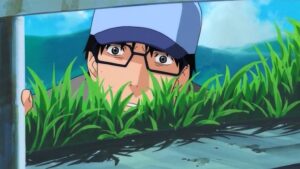
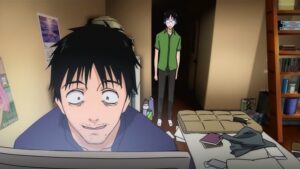


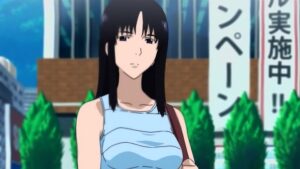
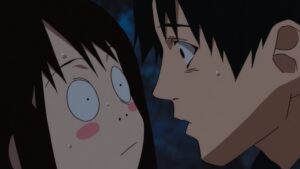
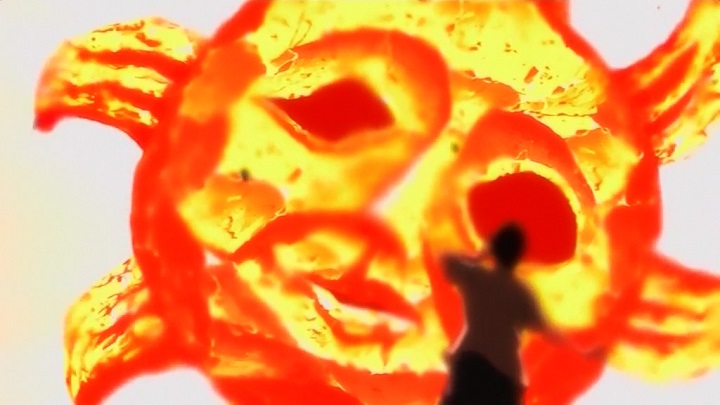
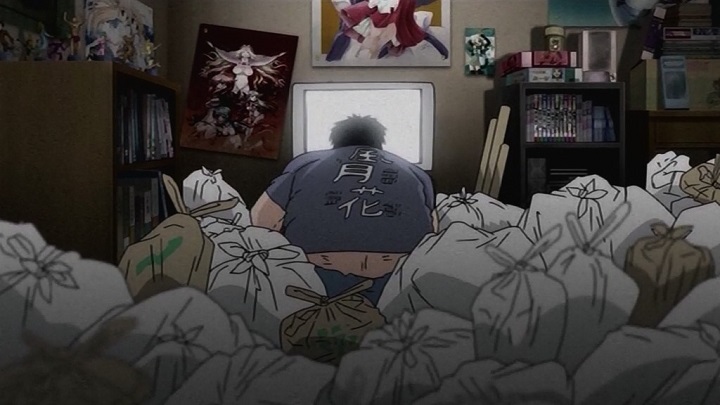
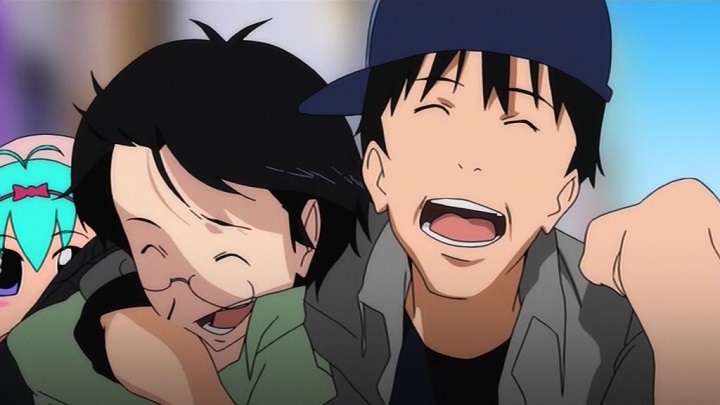
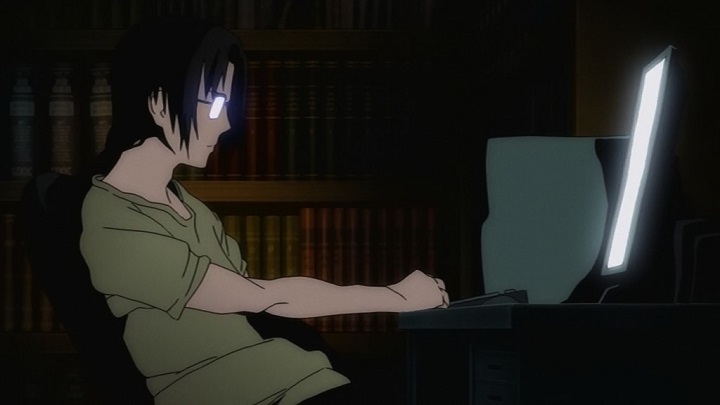
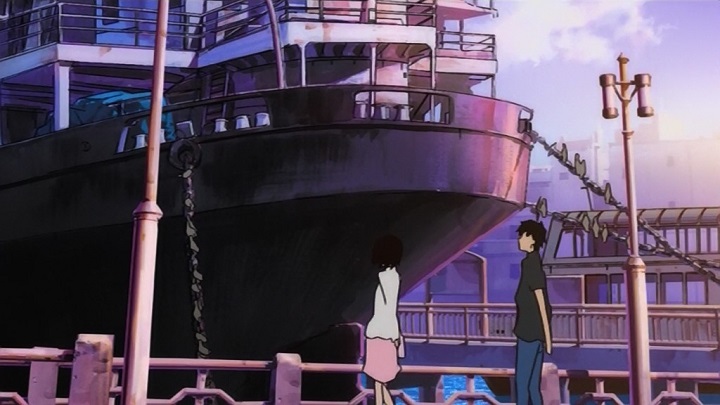
Looks like I will get to wait longer for a review of Big O.
One of these days I’m just going to watch it without posts and write it up I swear, because I keep wanting an excuse to go back to it.
“If you are in your early 20’s, just out of college or trade school or whatever, watch Welcome to the NHK.”
Absolutly agree, 100%. If anything it should be required viewing the minute you start jobseeking.
I actually think you could show this to a non-anime fan. I showed it to my Italian penpal who knows almost nothing about anime and he said it was an insightful look at otaku culture, inceldom, isolation while also saying he felt it was also a great comment on how a materialist modern society can put someone in this situation.
He joked saying its a good thing Kaoru didn’t have access to firearms.
He also mentioned laughing at it and feeling depressed simultaneously. His favourite episode was the suicide cult one.
He did call Sato a dumbass.
I watched this when I was around 18/19 but preferred the manga, now in my mid-30s I would probably see much more than just the dark humour were I to rewatch it now, and be depressed by it or feel more guilty laughing at it.
Probably a more isolated/less active-occupied/ more indoors person now in comparison to my teens and 20s but it doesn’t get to me due to my families comfortable financial status.